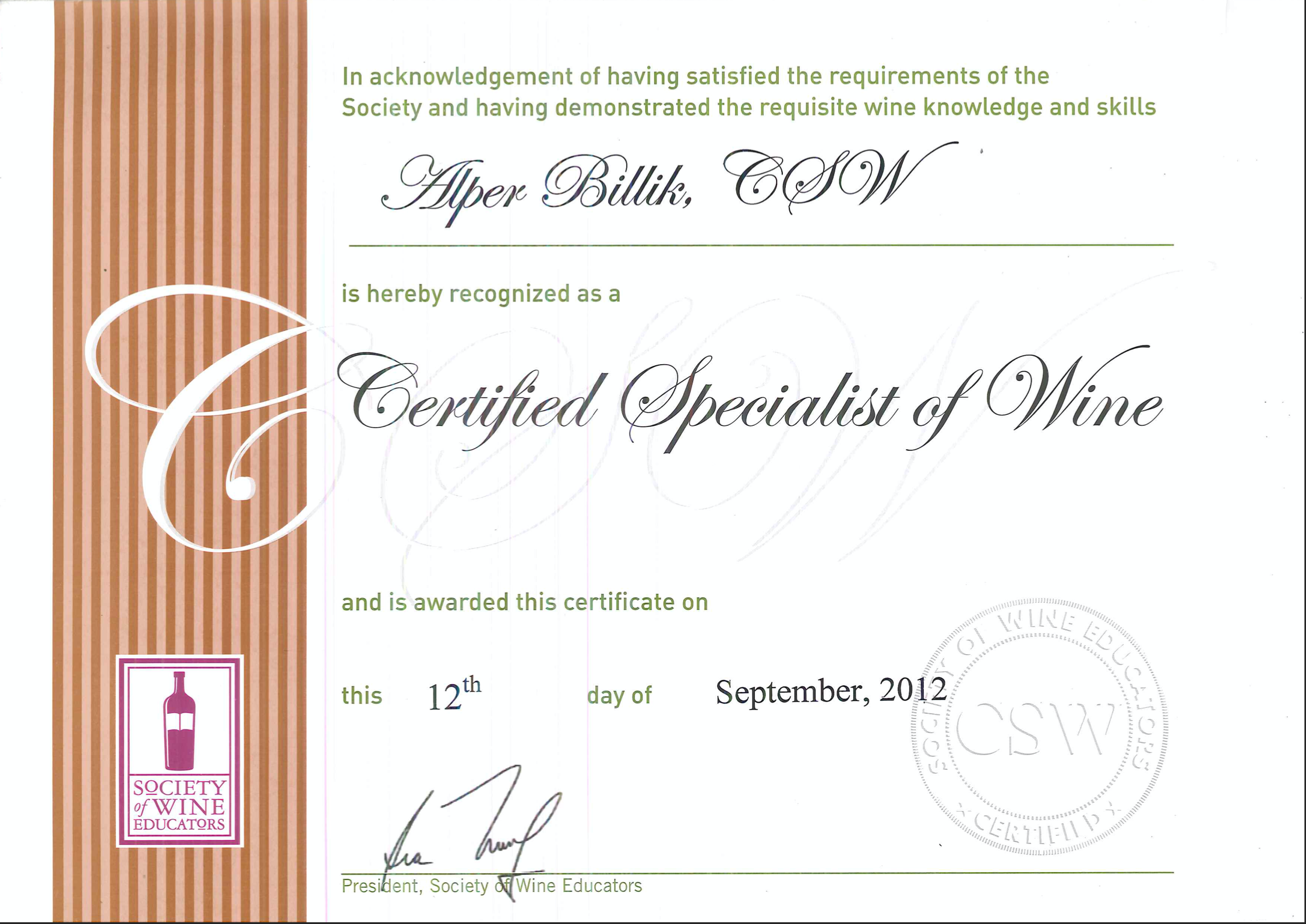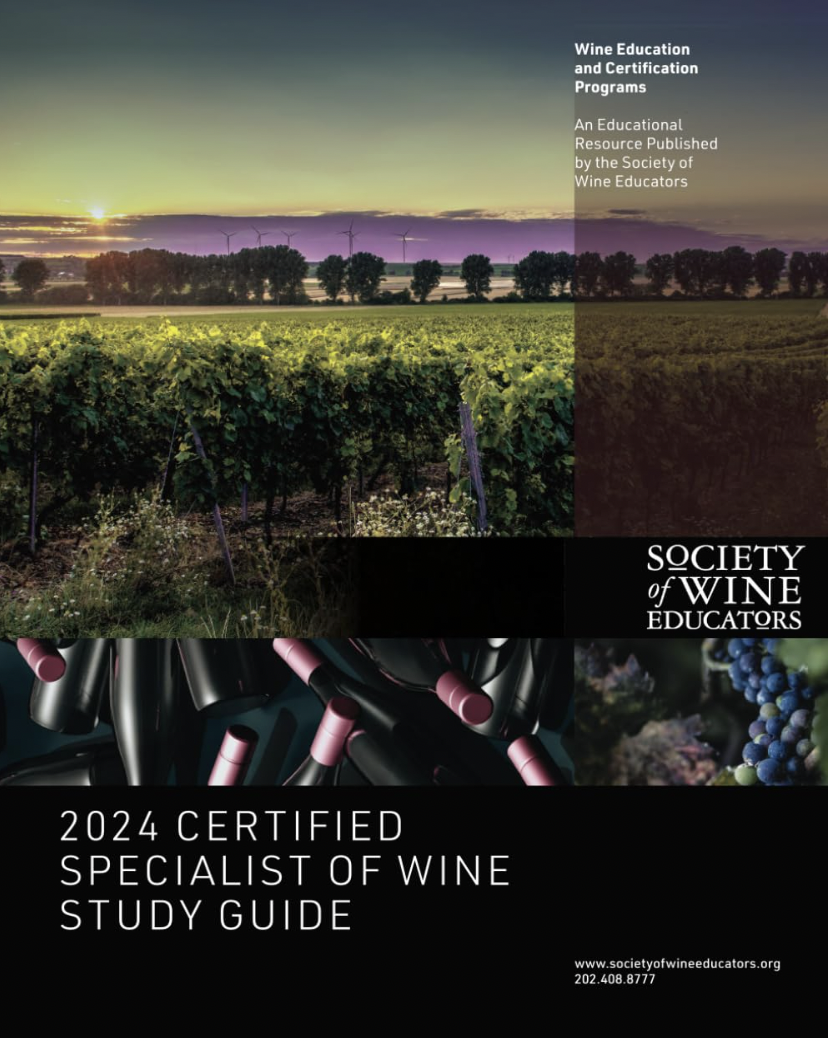How to Pass the CSW Certification: Benefits of the Certified Specialist of Wine Course
If you're passionate about wine, you may wonder which wine course is best. Many options are available, but the Certified Specialist of Wine (CSW) program is one of the most respected and well-known courses.
Designed by the Society of Wine Educators (SWE), this course covers all theoretical aspects of wine, from production to history. So, what are the benefits of taking the CSW course?
Let's take a look!
Globally Recognized Certification
One of the main benefits of taking the CSW course is its global recognition. The SWE is a highly respected organization, and its certification is widely acknowledged by employers in the wine industry. Whether you're looking to start or further your career in the wine industry, having a CSW on your resume will give you a significant advantage over the competition.
Comprehensive Theoretical Curriculum
Another benefit of the CSW course is its comprehensive theoretical curriculum. The course covers everything from wine production and history to grape varieties and wine regions. You'll also learn about wine-tasting techniques, food-pairing principles, and the intricacies of cellar management. By the end of the course, you'll have a thorough understanding of all theoretical aspects of the wine industry.
In-depth Learning with the Society of Wine Educators
Now, let's examine the Society of Wine Educators and how it ensures the quality and depth of the CSW course.
Society of Wine Educators
The Society of Wine Educators (SWE) was founded in 1977 as a nonprofit organization (501c3) dedicated to educating individuals about wine and spirits. SWE offers several professional certifications that are highly regarded in the wine industry. These certifications are designed to validate extensive knowledge and expertise in wine and spirits.
Professional Certifications Offered by SWE
Certified Specialist of Wine (CSW)
Certified Specialist of Spirits (CSS)
Certified Wine Educator (CWE)
Certified Spirits Educator (CSE)
Additionally, the SWE offers a Hospitality/Beverage Specialist Certificate, which covers a broad range of beverages, including but not limited to wine and spirits. Members can pursue these certifications and credentials through self-study programs and online classes led by experienced instructors.
Society of Wine Educators
The SWE is known worldwide, and its programs are highly regarded for how well they are and how well they fit the needs of the industry.
Understanding the CSW Exam Structure
The Certified Specialist of Wine (CSW) exam is a comprehensive test designed to evaluate a candidate's knowledge of the world of wine. Understanding the exam structure and the types of questions you will encounter is crucial for effective preparation. Below is a detailed breakdown of the exam format and the key topics.
Detailed Breakdown of the Exam Format
The CSW exam consists of 100 multiple-choice questions that must be completed within 60 minutes. It is administered electronically at a designated testing center or through an online proctoring service. Each question has four possible answers, with only one correct answer per question. The passing score for the CSW exam is 75%.
Key points about the exam format:
Number of Questions: 100 multiple-choice questions
Time Limit: 60 minutes
Question Format: Multiple-choice with four options per question
Passing Score: 75%
Types of Questions and Topics Covered
The CSW exam covers a wide range of topics, reflecting the comprehensive nature of the course material. The questions are designed to test your knowledge and understanding of various aspects of wine, from viticulture and vinification to wine tasting and wine laws. Here are the primary topics covered in the exam:
Viticulture
Grape varieties and their characteristics
Vineyard practices and climate influences
Common viticultural hazards and diseases
Vinification
Wine production processes for different types of wine (red, white, rosé, sparkling, and fortified)
Fermentation techniques and aging methods
The role of winemakers and enologists
Wine Regions
Major wine-producing regions of the world (e.g., France, Italy, Spain, USA, Australia)
Regional specialties and notable appellations
Geographical indications and their significance
Wine Tasting and Sensory Evaluation
Principles of wine tasting and sensory analysis
Identifying and describing wine aromas and flavors
Assessing wine quality and faults
Wine and Food Pairing
Basic principles of pairing wine with food
Classic pairings and why they work
Modern approaches to food and wine pairing
Wine Laws and Regulations
Overview of wine laws in key regions (e.g., AOC in France, DOC in Italy)
Labeling requirements and quality classifications
The impact of regulations on wine production and marketing
Sparkling and Fortified Wines
Production methods for sparkling wines (e.g., Traditional Method, Charmat Method)
Key styles of fortified wines (e.g., Port, Sherry, Madeira)
Serving and storage recommendations
Other Beverages
Basic knowledge of other alcoholic beverages (e.g., spirits, beer)
The relationship between wine and other drinks in the hospitality industry
Preparing for the Exam
To pass the CSW exam successfully, it is essential to thoroughly study each of these topics and practice answering multiple-choice questions. Utilizing study guides, attending review sessions, and taking practice exams can significantly enhance your readiness and confidence.
By understanding the exam format and the types of questions you will encounter, you can better focus your study efforts and increase your chances of achieving certification as a Certified Specialist of Wine.
Effective Study Strategies for Passing the CSW Exam
Preparing for the Certified Specialist of Wine (CSW) exam requires a well-organized study plan and the right resources. Here are some effective study strategies to help you succeed.
Creating a Study Schedule
Set Clear Goals
Define what you need to study and by when.
Break down the topics into manageable sections.
Allocate Study Time
Dedicate specific times each week for studying.
Aim for consistency, such as studying for an hour every day or several hours on weekends.
Use a Calendar or Planner
Schedule your study sessions and stick to them.
Include breaks to avoid burnout.
Recommended Study Materials and Resources
CSW Study Guide
The CSW Study Guide by the Society of Wine Educators is the primary resource.
This comprehensive guide covers all exam topics, including viticulture, vinification, wine regions, and more.
Available on Amazon.
Sommelier Puzzle Book
Our Sommelier Puzzle Book is a fun and interactive way to reinforce knowledge.
It includes puzzles, quizzes, and exercises to help you remember key concepts.
Purchase it from our SOMM DIGI SHOP.
Online Resources
Utilize online courses and webinars offered by the Society of Wine Educators.
Join wine forums and study groups to engage with other learners.
Make Wine Study Fun: Enjoy a Coffee Break with
Our Puzzle Book!
Tips for Retaining Information
Active Learning
Take notes while studying to reinforce information.
Summarize what you've learned in your own words.
Practice Regularly
Use flashcards to review key terms and concepts.
Take practice exams to test your knowledge and get familiar with the exam format.
Engage Multiple Senses
Listen to wine podcasts or watch educational videos.
Taste different wines and try to identify their characteristics.
Teach Others
Explain what you've learned to a friend or study partner.
Teaching helps solidify your understanding and identify any gaps in your knowledge.
Conclusion
Preparing for the Certified Specialist of Wine (CSW) exam can be challenging, but with the right strategies and resources, you can achieve success. Here are some final tips and encouragement as you approach exam day.
Encouragement and Final Tips for Exam Day
Stay Positive and Confident
Believe in the effort and time you have invested in your preparation.
Confidence can significantly impact your performance.
Get a Good Night's Sleep
Ensure you are well-rested before the exam day.
A clear mind will help you think more effectively.
Eat a Healthy Meal
Have a nutritious meal before the exam to keep your energy levels up.
Avoid heavy or sugary foods that might cause energy crashes.
Arrive Early
If you are taking the exam at a testing center, arrive early to avoid any last-minute stress.
For online exams, ensure your setup is ready and tested well in advance.
Read Questions Carefully
Take your time to read each question thoroughly before answering.
Avoid rushing and double-check your answers if time permits.
Stay Calm
If you encounter a difficult question, stay calm and move on to the next one. You can return to it later.
Use deep breathing techniques to stay relaxed.
Resources for Further Support
Society of Wine Educators
Access additional study materials, webinars, and forums through the SWE website.
Join study groups or connect with other candidates for mutual support.
CSW Study Guide
Ensure you have the latest edition of the CSW Study Guide available on Amazon.
This guide is comprehensive and essential for your preparation.
Enhance your learning with our interactive Sommelier Puzzle Book on Amazon. This resource provides fun and engaging ways to reinforce your knowledge.
Online Communities
Participate in online forums and social media groups dedicated to CSW candidates.
Sharing experiences and tips with others can be incredibly beneficial.
By following these tips and using the recommended resources, you'll be well-prepared to confidently tackle the CSW exam. Remember, preparation is key, and you've got this! Best of luck on your journey to becoming a Certified Specialist of Wine.




